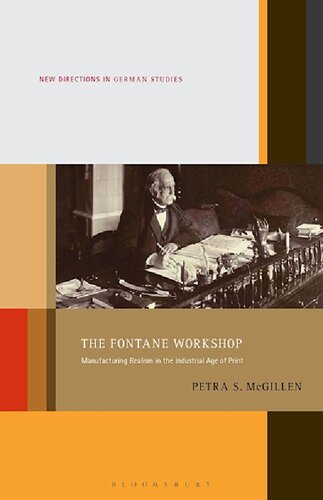Product desciption
The Fontane Workshop Manufacturing Realism In The Industrial Age Of Print Petra S Mcgillen by Petra S. Mcgillen 9781501351587, 9781501351556, 1501351583, 1501351559 instant download after payment.
With an innovative approach that combines material media history, media theory, and literary poetics, this book reconstructs the great German writer Theodor Fontane’s creative process.
Petra McGillen follows Fontane into the engine room of his text production. Analyzing a wealth of unexplored archival evidence--which includes a collection of the author’s 67 extant notebooks, along with an array of other “paper tools,” such as cardboard boxes, envelopes, and slips--McGillen demonstrates how Fontane compiled his realist prose works. That is, he assembled them from premediated sources, literally with scissors and glue, in an extraordinarily inorganic and radically intertextual manner that turned “writing” into a process of ongoing remix. By exploring the far-reaching implications of Fontane’s creative practices for our understanding of his authorship, originality, and poetics, this book opens up a completely new way to think about his works and, by extension, 19th-century literary realism.
This conceptualization of authors’ notebooks as creative tools makes a substantial contribution to scholarship on the history of writing media in several disciplines, from German studies and literary studies to media history, and to our understanding of the relationship between mass media and literary creativity in the late 19th century.
In the second half of the nineteenth century, the advent of industrialized printing technology transformed the conditions of literary production in Germany. Authors confronted a marketplace newly dominated by periodicals, the first modern mass media. Established accounts describe the relationship between literary writing and the mass press in terms of creative constraints and a loss of aesthetic autonomy. Petra McGillen’s analysis of the creative process of the great German realist Theodor Fontane challenges this narrative. Exploring Fontane’s notebooks and other little-known archival materials, McGillen demonstrates that in response to the industrialization of print, Fontane developed a new mode of creativity: he ran a “workshop” to assemble journalistic writings and prose works from a reservoir of textual snippets and imagery that the author and his helpers culled from the mass press.
With an innovative approach that combines material media theory, media history, and literary poetics, McGillen historicizes this form of authorship, arguing that Fontane’s composition practices continued the early-modern tradition of compiling and anticipated modern methods of remix. Comparing Fontane’s practices to those of Keller, Raabe, and Dickens, she concludes that Fontane’s “workshop” resulted in two innovations: a realism that was a media effect, produced with textual and visual materials that the author sampled and remixed on an unprecedented scale, and a model of authorship that reconciled literary writing with mass production. McGillen thus provides not only the first in-depth study of Fontane’s notebooks but also a new understanding of German realism as a period of innovative textual practices.


